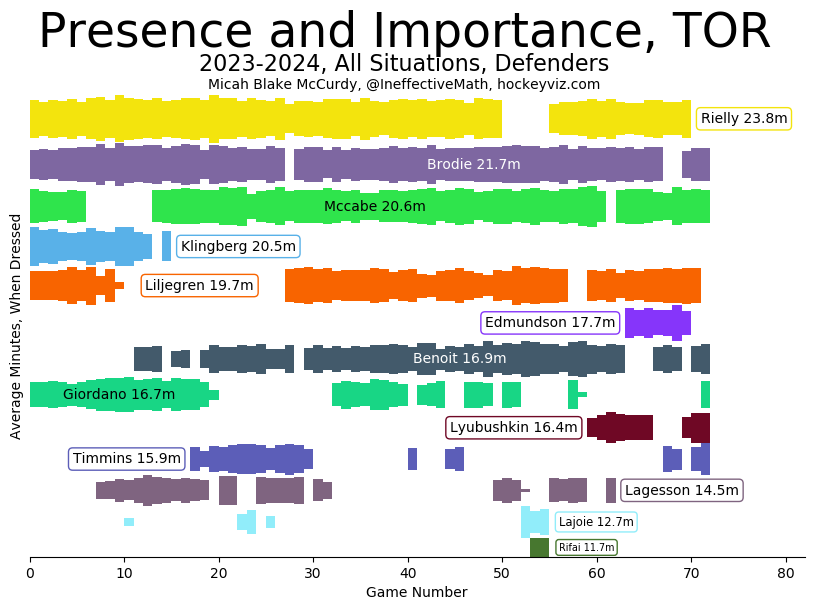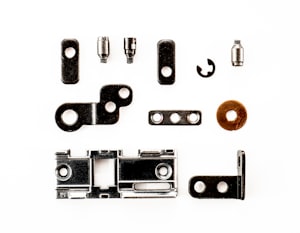The Maple Leafs signed Simon Benoit and Bobby McMann to matching deals – of different lengths – so naturally the question is who is next?
These two deals show an ideology of locking up the depth players to good but not overly expensive deals at the term that makes sense for players on the other side of 25. Benoit is younger than McMann, that's why his deal was longer.
Both Connor Dewar and Noah Gregor are on expiring deals, both are still RFAs and both have arbitration rights. Neither has much of a case, but if the Leafs wish to re-sign them, they would need to match that qualifying offer which is a modest increase of 5% in both cases. They could just be pre-emptively re-signed before the offseason.
Timothy Liljegren's situation is a completely different story to the depth players. His starts out the same as Dewar's and Gregor's: he is an expiring RFA with arbitration rights, but from there on it diverges. He's on the right side of 25, and doesn't hit that age until next season. He's not really depth as he's already paid $1.4 million, and he's got one other thing going for him. He's a right-shooting defender. Defender matters as much as handedness, as we'll see in a moment.
No player at his age and with his record is taking a pay cut. He's also not re-upping for the same number. The minimum he'll get is his qualifying offer amount of $1.5 million. But he has no reason to just take that offer, since he has arbitration rights. And that's where things get interesting.
From a purely asset management point of view, the Leafs would have been wiser to have underplayed Liljegren, sucked it up on having no other right-shooting defenders and kept him on the third pair this year. Pure asset management is a stupid way to run a hockey team, though. So the Leafs did play Liljegren big minutes when Morgan Rielly was injured. They did use him on the first power play unit, knowing that ice time and power play usage is a big factor in an arbitration hearing.
Liljegren is at 20 minutes a game this season, 18 last and over 16 the year before. The Leafs can't claim he's a third-pairing guy who is weak at defending and not all that helpful at offence. They used him like he's number two to Rielly, and that they had hopes of him growing into Rielly's replacement. And if they tired to claim they opened that door for him and he stumbled on the threshold, well, that's not going to mean a lot since they just kept playing him. Trade deadlines exist to deal with players who aren't what you thought they were.

They played him as the number five even when they were still deluded about John Klingberg. And after, he became number four, barely playing less than Jake McCabe. With Rielly out, he's number two. That moment when Klingberg went on LTIR for good, and the Leafs did not do anything to replace him is both a choice to not improve as a team and a decision that likely added at least a million to Liljegren's coming AAV.
Defenders get paid more that forwards. That's not true at the star level, with only four of the top 20 players by cap hit being defenders. But at the bottom end, the numbers game changes. There's only six defenders in a game. Teams routinely carry only seven at a time. The minimum salary guys like Benoit easily get something close to Liljegren's current amount just by playing well enough to be the seventh guy you're sorry to sit in the playoffs.
Of the defenders in the NHL this season who have played 41 games – a total of 193 players or six per team – only 44 have a cap hit under one million. Get rid of the guys on the list still on ELCs and that number drops to 21. If you imagine salaries at the bottom end for defenders to be like forwards – easy to find some guy at 27 who is good enough for $775,000 – you'll constantly be saying, "I'd rather they were paying him less." What you'd rather isn't how it works, though. In this light, that the Leafs even got one cheap year of Benoit is faintly amazing. Also the Ducks aren't very bright.
So Liljegren's cap hit is at $1.4 million because he's much better than Benoit by the way most people measure players. And it's going up because the Leafs used him like they think he's going up as well. Contrast this to the hardball played with Rasmus Sandin and that's where you see the magic right hand at play. It's hard to tell a team that believes that handedness matters significantly to keep Liljegren down to keep the cap hit down. Particularly when all arguments about how significant all this is are based on "I just think" reasoning. They will believe what they believe.
If Liljegren goes to arbitration with his case – subject to whatever happens whenever he returns to play this season – he's going to get at least $2.5 million, and he's going to ask for something well in excess of $3.5 million. A $3 million award is within the realm of reason.
So what do you do if you're the Leafs? Go with the lowest number you can get him at on a short-term deal via arbitration or bet on him growing into a contract that's bigger and longer.

A negotiation now puts Liljegren in the driver's seat because until some other moves are made, until a real renovation of the defence happens, Liljegren is a necessity. This is where the Leafs have maneuvered themselves because of concern over the cost of acquiring a quality defenceman and the lack of supply. In exactly the same way Sheldon Keefe had no choice but to play Liljegren on the top pair, the Leafs have to re-sign him at whatever they can get him to agree to. To change that reality, they need to add significantly at the top end of the defence corps.
I think the Leafs have to go to arbitration. Even though they've played their hand badly, largely through circumstances mostly beyond their control, they don't want to be making that gamble on a term contract now, and they don't even want to talk about it now. Pushing the whole issue off to an August hearing seems like it's in the team's best interest.
But it's in Liljegren's as well. Just like Ilya Samsonov this past summer, Liljegren should be UFA at the end of his next season – Puckpedia lists his UFA year as 2026. If a one-year deal is the result of arbitration, which he can ensure if the team elects the arbitration, then he can write his own script in 2026.
The Leafs haven't shown the confidence in Liljegren that would indicate they want to sign a term deal now at a number he would ever agree to. He has every reason to believe in himself, and the Leafs don't really have many. Kicking the can down the road with arbitration seems like the only way he stays on the team past draft day.







Comment Markdown
Inline Styles
Bold: **Text**
Italics: *Text*
Both: ***Text***
Strikethrough: ~~Text~~
Code: `Text` used as sarcasm font at PPP
Spoiler: !!Text!!